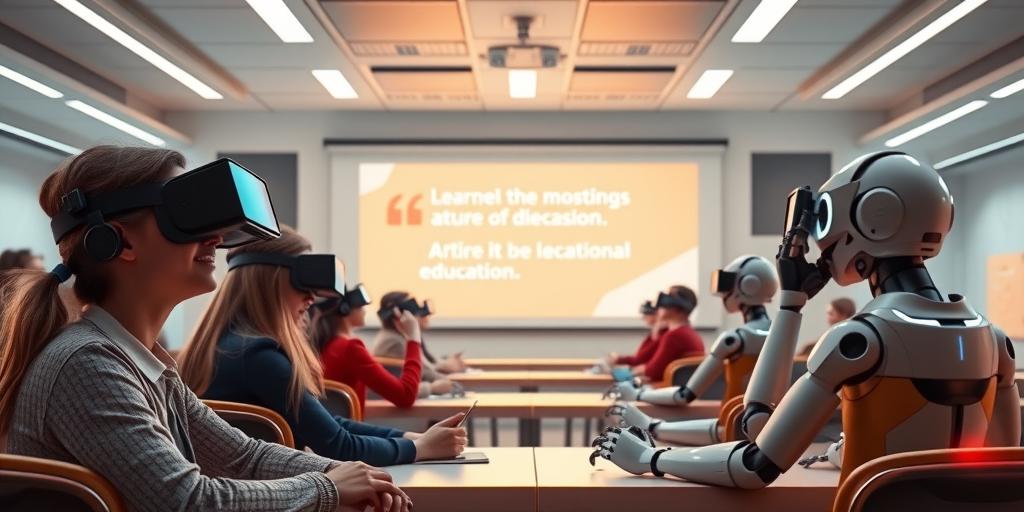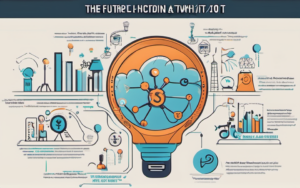The landscape of education is undergoing a dramatic transformation, fueled by the rapid advancement of Education Technology. This evolution is not just about incorporating technology into classrooms; it’s about reimagining the entire learning experience and empowering students with tools that cater to their individual needs and learning styles.
The Rise of EdTech: A New Era in Education
The Impact of Technology on Learning
The integration of technology into education has already had a profound impact. From online learning platforms to interactive whiteboards, technology has become an integral part of modern classrooms. This shift has led to increased accessibility, personalized learning experiences, and a greater emphasis on collaboration and critical thinking skills.
Emerging Technologies Shaping the Future of Education
However, the future of education technology promises even more transformative changes. Emerging technologies like artificial intelligence (AI), virtual reality (VR), and augmented reality (AR) are poised to revolutionize the way we learn and teach. These innovations will offer unprecedented opportunities to personalize learning, enhance engagement, and create immersive educational experiences.
Personalized Learning: Tailoring Education to Individual Needs
Adaptive Learning Platforms
One of the most exciting developments in education technology trends 2023 is the rise of adaptive learning platforms. These platforms use AI algorithms to analyze student performance and tailor learning materials to individual needs. By identifying knowledge gaps and providing targeted instruction, adaptive learning platforms empower students to learn at their own pace and achieve their full potential.
Artificial Intelligence (AI) in Education
AI is playing an increasingly significant role in the impact of artificial intelligence on education. Beyond adaptive learning, AI can be used to automate grading, provide personalized feedback, and even create customized learning paths. AI-powered chatbots can offer students 24/7 support, answering questions and providing guidance on their learning journey.
Personalized Learning Paths
The concept of personalized learning goes beyond simply adapting content. It involves creating individualized learning paths that cater to each student’s unique strengths, weaknesses, and learning preferences. Personalized learning experiences in education can be facilitated by AI-powered tools that track student progress, identify areas for improvement, and recommend relevant resources.
Virtual and Augmented Reality: Immersive Learning Experiences
Virtual Reality (VR) in Education
Virtual Reality (VR) has the potential to revolutionize the learning experience by creating immersive and engaging environments. Students can explore historical events, dissect virtual organs, or even travel to distant planets, all from the comfort of their classrooms. VR can make abstract concepts more tangible and bring learning to life in ways that were previously unimaginable.
Augmented Reality (AR) in Education
Augmented Reality (AR) overlays digital information onto the real world, creating interactive and engaging experiences. AR can bring textbooks to life, allowing students to interact with 3D models of anatomical structures or historical artifacts. AR can also be used to create gamified learning experiences, making learning more fun and engaging.
Creating Engaging and Interactive Learning Environments
By blending the physical and digital worlds, VR and AR can create truly engaging and interactive learning environments. Students can learn by doing, collaborating with peers in virtual spaces, and exploring topics in ways that were previously impossible.
Collaborative Learning and Global Connections
Online Learning Platforms and Communities
Online learning platforms have become increasingly popular, offering students access to a wide range of educational resources and opportunities for collaboration. These platforms allow students to connect with peers from around the world, participate in online discussions, and access expert-led courses.
Virtual Collaboration Tools
Virtual collaboration tools, such as video conferencing and shared document platforms, enable students to work together on projects, brainstorm ideas, and share knowledge. These tools foster a sense of community and encourage students to develop essential communication and teamwork skills.
Breaking Down Barriers to Access and Collaboration
Education technology is breaking down barriers to access and collaboration, allowing students from diverse backgrounds and locations to connect and learn from one another. This global interconnectedness is fostering a more inclusive and equitable learning environment.
The Future of Education: Embracing Innovation and Change
The Role of Technology in Teacher Training
Education technology is not just about equipping students with new tools; it’s also about supporting teachers in their role as educators. Teacher training programs are incorporating technology into their curriculums, providing teachers with the skills and knowledge they need to leverage technology effectively in their classrooms.
Addressing Ethical Considerations in EdTech
As education technology continues to evolve, it’s crucial to address ethical considerations. Issues such as data privacy, access to technology, and the potential for bias in AI algorithms must be carefully considered. It’s important to ensure that technology is used responsibly and equitably, benefiting all learners.
Preparing Students for the Future Workforce
The skills and knowledge required for success in the 21st-century workforce are constantly evolving. Education technology plays a vital role in preparing students for these challenges by fostering critical thinking, problem-solving, and collaboration skills. By embracing innovation and change, education can ensure that students are well-equipped to thrive in the future.
The future of education is bright, fueled by the transformative power of Education Technology. By embracing new technologies, fostering collaboration, and addressing ethical considerations, we can create a more personalized, engaging, and equitable learning experience for all.




